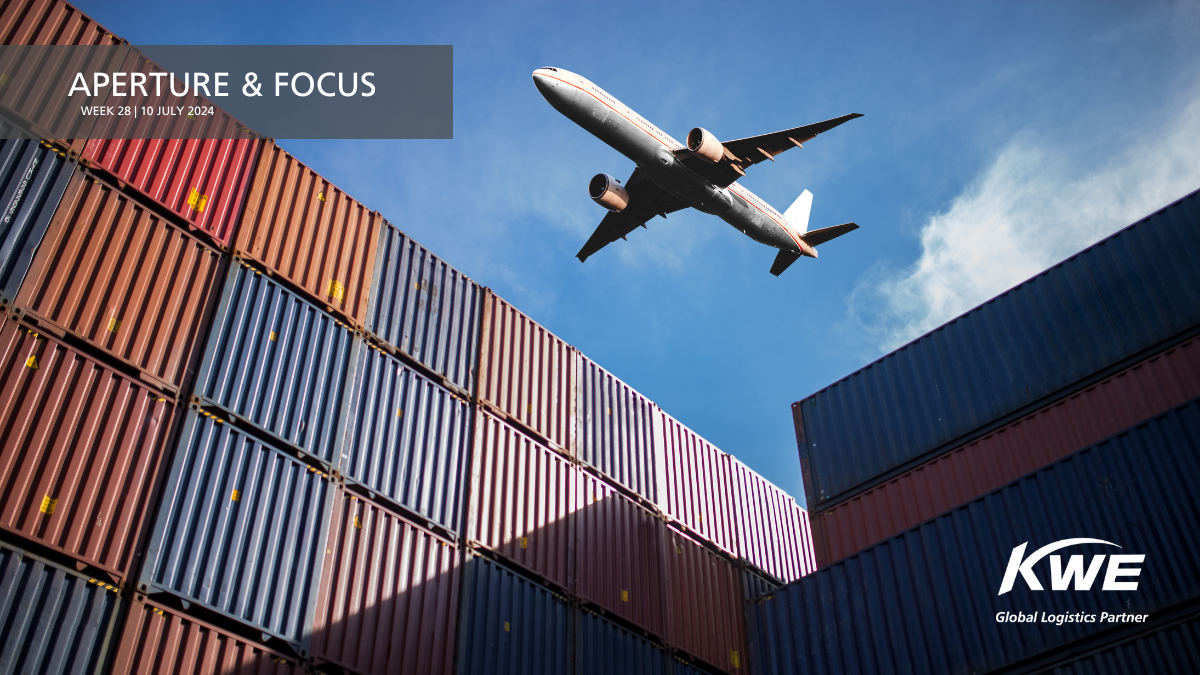Quote
Aperture & Focus 2024: Week 28

Global Aperture
Global air cargo volumes increased in June, continuing the upward trend seen throughout the first half of 2024. As demand continues to outpace supply, a significant rise in air freight rates is anticipated for Q4, with some carriers considering peak season surcharges for certain trade lanes.
Global supply chains remain stressed due to ongoing port strikes and labor disputes across North America and fluctuating demand worldwide. In Canada, a potential 72-hour strike by port workers was averted, but the threats of strikes by rail workers and U.S. East and Gulf Coast dockworkers loom. Meanwhile, global shipping disruptions are exacerbated by demand volatility, port congestion, and longer routes due to ongoing geopolitical issues.
Container ship congestion originating in Singapore and influenced by vessels avoiding the Suez Canal and the Red Sea has now extended to Port Klang, Malaysia. About 90% of container vessels arrive off-schedule at Singapore's port, leading to vessel bunching and increased waiting times. Port Klang is experiencing a longer queue of around 20 container vessels due to increased traffic diverted from Singapore’s port. By using these ports in Asia as transshipment hubs, the congestion has been exacerbated.
Regional Focus
Americas
United States: The ports of Corpus Christi, Houston, Galveston, Freeport, and Texas City closed on June 7th during Hurricane Beryl. The hurricane made landfall in Texas, as a Category 1 hurricane, bringing flooding and power outages across the state on June 8th. The storm, which previously caused damage in the Caribbean and Mexico, has weakened as it moves inland. The ports of Corpus Christi, Houston, and Freeport are in the post-storm recovery phase and have reopened as of July 10th. The Port of Galveston’s operations remained suspended as of July 10th.
Port of Indiana is moving forward with plans to develop the first international sea cargo container terminal on Lake Michigan at Burns Harbor, aiming to establish an all-water route for ocean vessels serving the greater Chicago area. The project received approval from U.S. Customs and Border Protection and the terminal is expected to begin operations in 2026.
Mexico: Mexico-based cross-border trucking operators face challenges in complying with California’s Advanced Clean Fleets regulation, set to affect trucks crossing into the U.S. starting in 2025. As a result of this mandate, which requires fleet owners to replace internal combustion engines with electric vehicles, trucking operators will have to adjust due to the compliance requirements and poor electric infrastructure in Mexico.
Canada: The Canada Industrial Relations Board (CIRB) has deemed a recent strike vote by the International Longshore and Warehouse Union (ILWU) Local 514 illegal, directing the union to withdraw its strike notice. On June 8th, the strike was called off after the CIRB found the strike notice violated the Canada labor code.
Asia-Pacific
China: The country launched a new China-Europe railway express service on July 3rd aimed at significantly increasing container volumes to Europe via the Caspian Sea. The service, which uses the Trans-Caspian International Transport Route, seeks to enhance trade routes by combining rail and sea transport for faster delivery times.
India: Indian major port and dock workers plan to hold a two-day hunger strike on July 25th and 26th to protest the government's port policies, which they believe undermine public ownership of major ports. This action could disrupt port operations, affecting cargo handling and potentially causing delays across India's major ports.
Air freight volumes from India have more than doubled in recent months due to the Red Sea crisis. This surge has led industry experts to emphasize the need to reduce trans-shipment times and improvements in efficiency and infrastructure integration across India's airports.
Europe, Middle East & Africa
France: Unions representing workers at Paris' airports have announced a strike for July 17th before the Paris Olympics. The strike would affect Charles de Gaulle and Orly airports, key entry points for the expected influx of 350,000 daily visitors and athletes during the Games.
German: The country’s major container ports, including Hamburg, Bremen/Bremerhaven, and Edem, have been brought to a standstill by “warning strikes” on July 9th called by the labor union Ver.di ahead of wage and contract negotiations on July 11th. The union aims to pressure terminal operators for better wage increases, citing inadequate offers that fail to keep up with inflation and job demands.
United Kingdom: The British Prime Minister aims to improve the UK's trade deal with the EU and strengthen ties with regional governments in Scotland, Northern Ireland, and Wales. The new government intends to address UK-EU trade friction, improve trade agreements, and enhance port operations and infrastructure. Key priorities include reducing trade barriers, harmonizing sanitary checks, and investing in port upgrades and offshore energy, all of which could streamline logistics and bolster supply chain resilience.